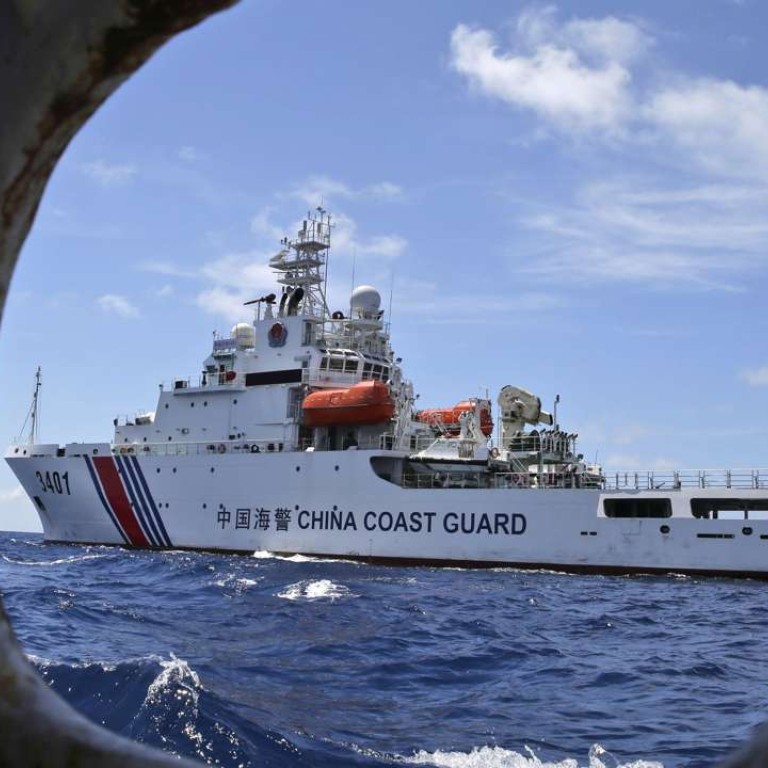
New | US presses China to be responsible power by obeying ruling on South China Sea
The US pressed China to abide by an international tribunal’s rejection of its claim over much of the South China Sea, framing the ruling as an opportunity for Beijing to show it’s the “global power it professes itself to be.”
In unusually strong comments Tuesday after the decision by the Permanent Court of Arbitration in The Hague, State Department spokesman John Kirby said the world was watching to see whether China would obey the decision over a waterway that hosts about US$5 trillion in trade a year. The country’s leaders have already said they won’t accept the ruling in the case, brought by the Philippines but followed closely by nations across Southeast Asia.
“This is a legally binding decision,” Kirby told reporters. “The world is watching to see if China is really the global power it professes itself to be and the responsible power that it professes itself to be.”
Kirby’s comments reflected US efforts to frame the ruling not as a discussion of the individual claims -- several countries assert sovereignty over parts of the South China Sea -- but as a matter of international law and order.
The US military has repeatedly sent ships near disputed waters as part of what it calls “freedom of navigation” manoeuvres. The US has also made clear it opposes China’s land reclamation and installation of military facilities on reefs and shoals there.
The US must now decide how firmly to push the matter, balancing its geopolitical desire to blunt Chinese influence in the South China Sea against caution about inflaming Chinese anger and the need to avoid any perception it’s meddling or making the problem worse. The US hopes the ruling will lead to productive talks about the claims once the dust settles and the rhetoric subsides, a State Department official who asked not to be identified told reporters on a conference call.
“We should recall that President George H.W. Bush is often remembered for his wise and -- at the time, unpopular -- insistence after the Iron Curtain fell in 1989 that Americans not ‘dance on the ruins of the Berlin Wall,’ said Paul Haenle, a China adviser for President George W. Bush who’s now director of the Carnegie-Tsinghua Center for Global Policy in Beijing. “It is in all sides’ interests to cool down tensions.”
Despite that concern, the dispute provoked new friction between the nations just hours after the ruling came down. China filed a formal protest against an earlier Kirby statement calling the ruling an “important contribution” to the goal of a peaceful resolution in the sea.
Chinese Foreign Ministry spokesman Lu Kang said the US is “always selective when it comes to the application of international law: citing international law when it sees fit and discarding international law when it sees otherwise,” the state-run Xinhua News Agency said. The website of the Communist Party’s mouthpiece, the People’s Daily, called the arbitration a US-led conspiracy.
Kirby was prepared for that criticism, along with the argument the US has little ground to stand on since it hasn’t ratified the treaty on the law of the sea that governed the ruling. He cited a 1984 ruling by the International Court of Justice on a maritime dispute between the US and Canada. Both sides “complied with the decision,” Kirby said. “So we have done this ourselves.”
US presidential candidate Hillary Clinton said all claimants in the arbitration case should “continue to pursue peaceful, multilateral means to resolve disputes among them.”
The US has a deep interest in the South China Sea, “and to the free flow of commerce -- so critical to our economy -- that flows through it,” she said in a statement.
A White House official also stressed the importance of the rule of law in a speech shortly before Kirby spoke. Dan Kritenbrink, the National Security Council’s senior director for Asian affairs, reiterated that the US would accept any conclusion the claimants work out.
“What we are not prepared to accept, however, is the emergence of a different set of rules in the South China Sea relative to the rest of the world,” Kritenbrink said. “We believe that such a development would lead to breakdowns in the rules-based international order.”
Kritenbrink also said the US would keep up a “steady tempo” of military operations in the region, including freedom of navigation manoeuvres. China has said such operations exacerbate tensions and calls them a pretext for the US to undermine China’s claims.

